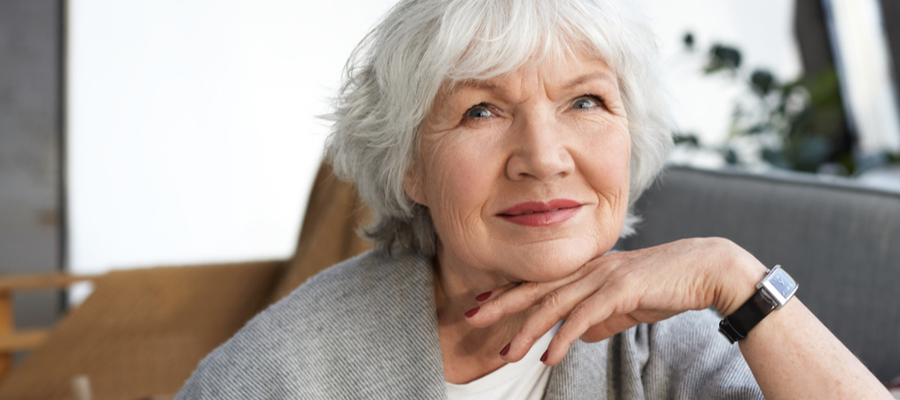As older women hunker down for the second wave of the COVID pandemic, I’m curious how many of us dread becoming invisible once again. Or have we already become accustomed to our invisible status? Before there was a virus, there was the syndrome of the invisible woman. If you’re older than 55 years, you’ve most likely experienced what it feels like to become invisible. Or are we finally pushing back against becoming invisible?
You recall that feeling of invisibility. It’s when you’re standing at the counter to make a purchase and no one notices you. Or when the shoe salesman pretends not to see you while serving a younger customer.
It started happening to me about seven or eight years ago. At first, I thought it was a coincidence, but then it dawned on me that younger folks just didn’t see me. I was becoming invisible and it’s a strange and unpleasant sensation.
What had changed? Did I look that different, dress that different or act that different? I’ve always been interested in fashion and I’ve never thought of myself as a shrinking violet.
What I believe happened was that I had begun internalizing the notion that older women should defer to others, to those with more urgent tasks at hand. Since retiring from my full-time job, I wasn’t in a hurry, where every minute counts and you need to get the errands done before you pick up the kids after school. Now I have time to shop at a leisurely pace, to drive at the same slow pace, to just think and observe and enjoy my surroundings.
However, our society prefers everything to be done at the speed of lightening. Although we preach that slowing down is important to our mental health, out in public, the world is racing around us.
Worst yet is when you arrive at a restaurant by yourself and wonder if anyone will seat you. Time isn’t a huge issue so I’m not in a hurry as are the rest of the lunchtime crowd. I savour my time alone and prefer to stretch it out. Lunching on my own is one of my favourite pastimes; I’ve done it since I was a young woman. For me, there’s something special about enjoying lunch with a good book to keep me company, or people-watching, or even chatting with the wait staff. It only goes wrong when the hostess looks askance when I enter the restaurant.
“Table for one?” she asks, not so innocently.
“Yes, it’s just me,” I reply, trying to sound confident and at ease.
Then off we go to the corner of the restaurant beside the kitchen door. Or not. Sometimes I’m seated at a good table near a window, or even better at a booth. When that happens, I make sure to frequent the restaurant more often, tell my friends about it, and leave a better tip. Before the pandemic, I was finding that it was more often the booth than the back corner.
Happily things are changing. Women my age are addressing unaccommodating behaviour in our own way. You can bet, over the long run, it’s going to be successful. Boomers are changing the discourse around aging and how we want to be treated at work, in public and at home. So many of us joined the workforce directly after university or college and kept working through pregnancies and while raising the kids. We tried to become equal partners with our spouses, and again, many of us succeeded. As we age, those accomplishments, those massive steps forward to equality haven’t been forgotten.
American actress Jane Fonda, age 82, is a case in point. In her memoir Prime Time, she writes that the system of marginalizing older women (and men) is out-dated and past its best before date:
“Our culture has not come to grips with the ways the longevity revolution has altered our lives. Institutionally, so much of how we do things is the same as it was early in the twentieth century, with our lives segregated into age-specific silos: during the first third we learn, during the second third we produce, and the last third we presumably spend on leisure.”
Fonda entreats society “to compose together a template for how to maximize the potential of this amazing gift of time, so as to become whole, fully realized people over the longer life arc.”
As HomeEquity Bank’s Executive Vice President of Marketing and Sales, Yvonne Ziomecki remarks, “The first goal is to speak out against stereotypes when you see them. At this point, some older people are feeling really marginalized by the society. One way older people can help in this struggle is to give themselves permission to speak up and tell those around them what they want and need.”
The fall and winter of 2020 to 2021 is not looking like it will be kind to the older generation, but I don’t believe it’s the time to stop advocating for better, more thoughtful and inclusive treatment throughout the pandemic. For one thing, the suffering in many long-term care homes hasn’t been solved.
On September 18, when new cases of COVID peaked to 401 in Ontario, Dr. Nathan Stall, Associate Fellow at the NIA (National Institute of Aging) in Toronto, was among the first to point out that the current outbreaks are a reminder of just how quickly COVID-19 can spread, particularly among vulnerable older Canadians. By September 21, the number of new cases in Ontario was 425, the most in more than three months.
“Long-term care actually isn’t getting the spotlight I would argue it deserves,” Stall stated. “We have 20 homes under active outbreaks in the province, and these things spread like wildfire as we do see.”
As we head into the long fall and winter ahead, let’s try to keep our chins up. Make sure to reach out to your friends and family. Schedule get-togethers online. Keep up with the many conversations, lectures and events available online –often for free– through the organizations you frequented before the pandemic. Try new ones, too.
My good friend, who owns and operates an international company, has decided to hunker down at her vacation home until November. Between her laptop and phone, she’s running her business from her dining room table. “I love it,” she says. “The world is coming to me.”
 |






























